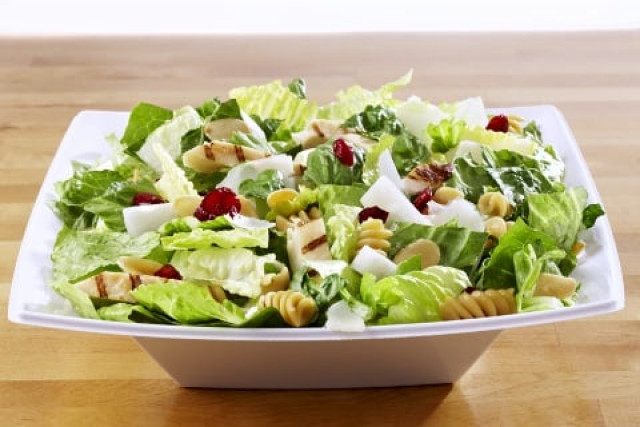How salad can make us fat
Salad with your cheeseburger seems like a good trade-off, but increases the chances of ordering an unhealthy choice

PHOTO: REUTERS
Route data from more than 1,000 shoppers, matched to their purchases at checkout, revealed a clear pattern: Drop a bunch of kale into your cart and you’re more likely to head next to the ice cream or drinks section. The more “virtuous” products you have in your basket, the stronger your temptation to succumb to vice.
Such hedonic balancing acts are neither unpredictable — who, after all, hasn’t rewarded themselves with a piece of cake after a killer workout? — nor inherently bad. But an emerging body of research into what psychologists call the “licensing effect” suggests that this tit-for-tat tendency is deeply wired in us, operating even when we’re not aware of it. And in a world where we’re bombarded by pitches for an endless array of health-boosting products of dubious efficacy, that can be a problem.
Top 5 heart-healthy foods
The key insight underlying the licensing effect, which was first described in 2006 by Uzma Khan, then a professor of marketing at Carnegie Mellon University, and Ravi Dhar of the Yale School of Management, is that our choices are contingent: Since we each have a fairly stable self-concept of how good/bad, healthy/unhealthy or selfish/altruistic we are, when one decision swings too far from this self-concept, we automatically take action to balance it out.
The result plays out in surprisingly subtle ways. Ordering a side salad to go with your cheeseburger is a deliberate and arguably rational trade-off between pleasure and health; but consumer researchers have found that the mere presence of a healthy option on a menu increases the chances that you’ll order the least healthy choice. You’re more likely to choose French fries if there’s a green salad available — a realisation that fast food restaurants have profited from handsomely.
Curiously, it’s those with the greatest self-control who are most vulnerable to this type of influence. They’re confident in their ability to resist temptation, so knowing that a healthy option is available licenses them to indulge this time and — in theory, at least — make up for it next time.
This halo effect was even more obvious in a study where weight-conscious people were asked to guess the calorie content of a series of meals. When shown a burger, their average guess was 734 calories; when shown the same burger alongside three celery sticks, the average guess dropped to 619. These are not rational calculations; they betray the shortcuts your brain takes in its running tally of vice and virtue.
7 days, 7 healthy dinners
All this helps to explain why many health researchers cringe when promises of an “exercise pill” hit the headlines, as they did yet again earlier this month following the publication of two new studies. “I want to be clear that really there is no way to replace routine exercise with an exercise pill,” one of the scientists insisted. But the licensing research suggests that’s exactly what we would try to do, wittingly or not.
Consider the almost surreal results of a series of studies by researchers in Taiwan. In one test, half of the subjects were told a pill was a placebo (which it was), while the other half were told that it was a multivitamin. Those who thought they had consumed a vitamin pill consistently chose less healthy options.
When testing out a pedometer on one of two routes, they were more likely to take the shorter one. At lunch, they preferred the all-you-can-eat buffet to the healthy organic option. In psychological tests, they expressed a greater desire for “hedonic activities” like casual sex, sunbathing and excessive drinking.
With a group of smokers, those who thought they’d been given a vitamin C pill smoked nearly twice as many cigarettes, while filling out the questionnaires, as those who were told the pill was a placebo. And dieters given a purported weight-loss supplement ate more at the subsequent buffet lunch.
This quasi-Newtonian problem of reactions canceling out actions isn’t unique to health. Safety interventions like seatbelts, bike helmets and football pads have been blamed for promoting riskier behavior. We have a deep-seated urge to remain, as a “Seinfeld” episode once put it, “Even Steven.”
But it’s a particular problem in health because we’re confronted with so many decisions on a daily basis and yet the outcomes we’re most concerned about — like disease, disability and, ultimately, death — are difficult to measure, heavily influenced by chance or too far into the future to be sure of cause and effect. That leaves us vulnerable, because unlike Newton’s Third Law, the actions and reactions of the licensing effect aren’t necessarily “equal and opposite.” Few of our health decisions are clear-cut, so we’re left weighing uncertain benefits against unknowable behavioral compensation.
So how can we maximise our chances of coming out ahead? Psychologists have identified a few tactics. One is to focus on the process of living healthfully rather than the goal of being healthy. A recent University of Zurich study tracked the progress of 126 dieters and found that, as predicted by licensing theory, the more weight the subjects lost in any given week, the less weight they would lose (or the more they would gain) the following week. But this rebound effect was weakest when the subjects homed in on the process of changing their eating behavior rather than on the outcome of losing weight or improving their appearance.
Another approach, proposed by Professors Khan and Dhar, is to narrow your focus so that you weigh the pros and cons of each decision in isolation. To illustrate this principle, they offered either a single free movie rental or two rentals (once a week for two weeks) to a group of undergrads. In the one-shot choice, just over half the subjects opted for a “lowbrow” film like “Dumb and Dumber” rather than a weightier selection like “Schindler’s List.” But when they knew they’d get another chance to make a “good” choice, the number who went lowbrow shot up to 80 per cent.
The same pattern showed up when they offered volunteers a single-shot or repeated choice of plain low-fat yogurt or a cookie. Crucially, a further experiment showed that those who picked the indulgent option one week didn’t make up for it by picking the virtuous option the next week. So if you want to indulge, go for it — but don’t kid yourself that you’ll balance it out later.
Ultimately, we all know how to live healthfully: Exercise regularly, eat real food, get plenty of sleep and so on. But these simple precepts can be inconvenient and time-consuming. So you can be excused for wishing that the right super-juice or latest fitness gadget would get the job done more easily.
But the only foolproof way to defeat the licensing effect is to hold yourself to a higher standard when you’re making health decisions. Stick to the well-proven basics and tune out the noise of the commercial health-promotion industry, whose ever-optimistic mantra is “It might help … and it can’t hurt.” That’s a nice thought, but it’s almost always an illusion.
This article originally appeared on the New York Times, a partner of The Express Tribune.



















COMMENTS
Comments are moderated and generally will be posted if they are on-topic and not abusive.
For more information, please see our Comments FAQ